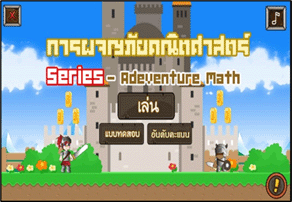The Development of a Mathematical Adventure Game Using Construct2 Software
Main Article Content
Abstract
Games are crucial for digital-age learning in children and youth. This research aimed to develop a math adventure game using Construct2, a role-playing game (RPG), designed for primary school students in the first phase (Grades 1-3). The goal was to foster both learning and enjoyment while solving mathematical problems involving addition, subtraction, units, and tens. The expectation was that this would cultivate a positive attitude towards mathematics and enable students to use the game for reviewing lessons. The research employed the IMMCAI model, following a four-step process: (1) Analysis, (2) Design, (3) Development, and (4) Experimentation and evaluation. Three experts evaluated the game's quality. The results indicated that the math adventure game developed using Construct2 was highly suitable for use as a teaching tool in primary school, specifically for Grades 1-3 ( = 3.97, S.D. = 0.56)
Article Details

This work is licensed under a Creative Commons Attribution-NonCommercial-NoDerivatives 4.0 International License.
Articles published in this journal are copyrighted by the Faculty of Industrial Technology. Nakhon Si Thammarat Rajabhat University
In addition, research results and academic works published in the journal It is the independent opinion of the author. The author is responsible for any legal consequences that may arise from the published article. The editorial team and the journal's production team, we don't always have to agree.
References
Liu, Z. Y., Shaikh, Z. A. and Gazizova, F. 2002. “Using the concept of game-based learning in education,” International Journal of Emerging Technologies in Learning. 15(14): pp. 53-64.
Ladawan, Y. 2016. “The Design and Development of game-based learning for 6 th grade mathematics,” B.Sc. thesis, Information Technology., Suranaree University of Technology. Bangkok, Thailand. (in Thai)
Zhang, L. 2022. “The design of game-based learning and learning analytics,” Cypriot Journal of Educational Sciences. 17(5): pp. 1742-1759.
Russo, j., Bragg, L. A. and Russo, T. 2021. “How primary teachers use games to support their teaching of mathematics,” International Electronic Journal of Elementary Education. 13(4): pp. 407-419.
Ergül, E. and Dogan, M. 2022. “Using game-based learning in place value teaching in primary school: A mixed method study,” International Journal of Progressive Education. 18(5): pp. 1-17.
Natthaphong, K., Jakrapob, M., & Kritsakorn, R. 2020. “Distancing game,” B.B.A. Thesis, Business Computer., Udon Rajabhat Univ. Udon Thani, Thailand. (in Thai)
Dan, N. N., Thien Trung, L., Thi Nga, N. and Dung, T. 2024. “Digital game-based learning in mathematics education at primary school level: A systematic literature review,” EURASIA Journal of Mathematics, Science and Technology Education. 20(4): pp. 1305-8223.
Aree, S. 2010. “The development of learning outcome on adding and subtracting of first grade students taught by 7E learning cycle approach,” M.Ed. Thesis, Curriculum and Supervision., Silpakorn Univ. Bangkok, Thailand. (in Thai)
Praet, M. and Desoete, A. 2014. “Enhancing young children’s arithmetic skills through non-intensive, computerized kindergarten interventions: A randomized controlled study,” Teaching and Teacher Education. 39 (4): pp. 56-65.
Waraporn, S., Samran, M., & Wachira, W. 2019. “A study of the teaching methods by game to develop mathematical skills of plus numbers 0 - 100 for students grade 1 at Thetsaban 2 School (Wat Thung Suan),” B.Ed. Thesis, Elementary Education., Kamphaengphet Rajabhat Univ. Kamphaengphet, Thailand. (in Thai)
Kaenwong, V. 2015. “Development of a computer assisted instruction program in the technology for creation 3 course on the topic of typing with computers for Prathom Suksa III students of Darasamut Si Racha school in Chon Buri province,” M.Ed. thesis, Sukhothai Thammathirat Open University. (in Thai)
Arrosyad, M. and Nugroho, F. 2022. “Pengembangan digital transforms role playing games (RPG) base learning pada Pendidikan Kemuhammadiyah Sekolah Dasa,” Research & Learning in Elementary Education. 6(3): pp. 3462-3472.
Thanasarn, R., Panchit, L., and Natcha, D. 2015. “Blended-Learning Educational Game to Support Learning on How to Assemble Computers,” M.Sc. Thesis, Science. thesis, King Mongkut's University of Technology. Thonburi, Thailand. (in Thai)
Sakkiret, P. 2020. “Design and Development of Computer Assisted Instruction Using ADDIE Model and Concept of Gagne,” B.Ed. thesis, Digital Technology for Education., Bansomdejchaopraya Rajabhat Univ. Bangkok, Thailand. (in Thai)
Chollada, P., et al. 2023. “Development of a Computer Game for Education on the Topic of Basic Electrical Measurements Usage,” D.Fd. thesis, Industrial Ed., Rajamangala University of Technology Thanyaburi. Pathum Thani, Thailand. (in Thai)
Sumai, B., & Sasichai, T. 2014. “Computer Games with Learning in Digital Age,” B.S.Tech.Ed. thesis, of Technical Ed., King Mongkut's University of Technology North. Bangkok, Thailand. (in Thai)
Khom, K. 2020. “Development of Computer Traffic Data Storage Systems within Academic Resources and Information Technology Pibulsongkram RaJabhat University,” B.S.Tech.Ed. thesis, Pibulsongkram Rajabhat Univ. Phitsanulok, Thailand. (in Thai)
Kareema, F., Ismail, M. and Zubairi, A. M. B. 2022. “Item Objective Congruence Analysis for Multidimensional Items Content Validation of a Reading Test in Sri Lankan University,” Canadian Center of Science and Education. 15(1): pp. 1916-4742.
Prasopchai, P. 2015. “Validity of Questionnaire for Social Science Research,” B.Ed. thesis, Social Studies., Srinakharinwirot University. Bangkok, Thailand. (in Thai)
Hassani, H., Ghodsi, M. and Howell, G. 2021. “A note on standard deviation and standard error,” Teaching Mathematics and Its Applications. 29(2): pp. 108-112.
Kosztyán, Z. T. and Katona, A. I. 2018. “Risk-Based X-bar chart with variable sample size and sampling interval,” Computers & Industrial Engineering. 120(2): pp.308-319.


